The business magnates’ long goodbye: How the world’s richest people are planning their succession
Warren Buffett, Rupert Murdoch, Carlos Slim, Amancio Ortega, Juan Roig, Giorgio Armani and Bernard Arnault are facing one of the most critical moments for any family business: generational change. And in some cases, it is far from clear who will be their successor
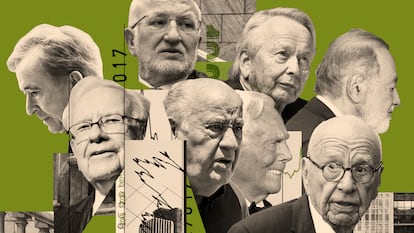

“This whole family is a nest of vipers. They’ll wrap themselves around you and suffocate you.” These were the words of Ewan Roy, Logan’s older brother in the hit HBO series Succession, as he warned his grandson Greg about the dangers of entering the family business. The series, with its volcanic patriarch Logan Roy and the ruthless battle for control of the media conglomerate Waystar Royco, presents an extreme parody of the power struggles that can arise when a leader’s reign nears its end. But sometimes, fiction and reality aren’t that far apart. Generational transitions are among the most delicate and challenging moments in the life of a family business.
“Not all of them manage to get through it,” admits María Iturriaga, a professor at Deusto Business School. “It is a process that requires planning to ensure an orderly transition, identifying what you want to do. But that often doesn’t happen. Sometimes there is a lack of generosity on the part of the founders.”
Some of the world’s largest business conglomerates are nearing their own Rubicon. The average age of the 30 wealthiest people globally is 70, and the moment to pass the baton is approaching. “One of the biggest mistakes is making potential heirs compete against each other — it creates winners and losers,” explains Alberto Gimeno, a professor at the business and law education center Esade, who specializes in management and strategy.
Regarding the best solution for passing on the baton, he says that there’s no one-size-fits-all solution for succession. “Replacing a charismatic leader is always complicated and often implies a shift in the company’s model. The role that the family will play is key. The family can give up the day-to-day running of the company, giving executive control to a director outside the family, but never control. That is why it is key to create a functional and professional board of directors that supports the managers.”
EL PAÍS correspondents explain how generational change is taking place in some of the world’s largest business conglomerates.
United States
Buffett ties succession and inheritance
By Miguel Jimenez (Washington)
The world’s most famous investor, Warren Buffett, 94, has already arranged his succession plan. Despite the passing of his longtime partner and right-hand man, Charlie Munger, last year, Buffett shows no signs of retiring. In May 2021, the Oracle of Omaha announced that his successor as CEO of the Berkshire Hathaway conglomerate would be Greg Abel, who has been the vice-chairman since 2018 and head of the group’s energy division. Abel, a 62-year-old Canadian, will assume the role of CEO, but he will not replace Buffett as chairman. That position is expected to go to Buffett’s son, Howard, who will take on the role without executive responsibilities.
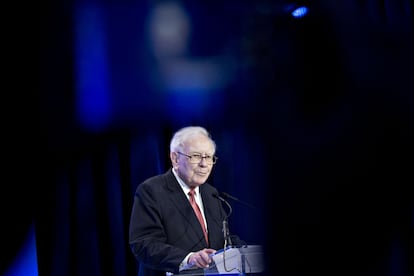
In principle, Greg Abel will have the authority to make investment decisions, as Warren Buffett explained at the Berkshire Hathaway shareholders’ meeting in 2023 and reiterated again this year. “I think the responsibility ought to be entirely with Greg. I used to think differently about how that would be handled, but I think the responsibility should be that of the CEO,” Buffett said in May, noting that the final decision on the matter would still be made by the board. Ajit Jain, 73, who has served as vice-chairman of Berkshire Hathaway’s insurance operations since 2018, is expected to continue leading that division.
Warren Buffett also unveiled another key detail about his future this year: the fate of his inheritance. The investor — currently the ninth richest person in the world with an estimated fortune of $144 billion — plans to leave the bulk of his wealth to a new charitable foundation run by his children. Buffett has three children: Susan, 72; Howard, 69; and Peter, 66. Susan and Howard both serve on the board of Berkshire Hathaway, and all three siblings already manage their own charitable foundations. However, Buffett intends to entrust his inheritance to a new foundation, where decisions about the distribution of the funds would require unanimous agreement among the three.
“You should write your obituary and figure out how to live up to it,” Buffett said at Berkshire Hathaway’s shareholder meeting last year. His obituary will say he has put his corporate succession on track and is bequeathing his fortune to a foundation run by his children.
United Kingdom
The Murdochs battle in court
By Rafa de Miguel (London)
Rupert Murdoch is Australian, and acquired U.S. citizenship in 1985 in order to be able to gain ownership of the influential television network Fox News. However Murdoch’s influence on British politics and involvement in various scandals over the past decades have made the struggle for future control of his media empire feel like a quintessentially British soap opera.
The Murdoch family served as the primary inspiration for the television series Succession. Now, a court in Reno, Nevada, has been in a hearing since September — closed to the press — to reconsider the trust that distributes control of the Murdoch empire among family members.
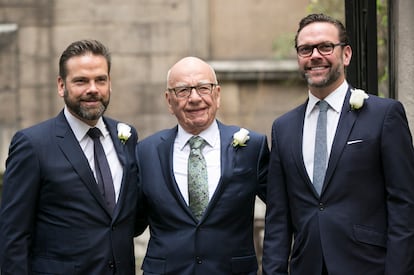
The trust, established in 1999, grants the Murdoch family eight votes, giving them decisive control over the boards of their companies. News Corporation, which oversees influential media outlets like The Times, The Sun, and The Wall Street Journal, also controls a vast network of radio and television stations. Fox News in the U.S. and Talk TV in the U.K. are key players in shaping conservative political discourse in their respective countries.
Rupert Murdoch, 93, holds four of the trust’s votes. The other four are divided among his eldest children: Prudence (66), Elizabeth (56), Lachlan (53), and James (51). His two youngest daughters, Grace (22) and Chloe (21), born from his third marriage to Wendi Deng, are not included in the trust.
In recent years, Rupert and his son Lachlan have become more aligned in their far-right political views and the role they believe their media outlets should play in shaping those perspectives. One significant shift occurred when Rupert stepped down as chairman of Fox and News Corp, handing the reins to Lachlan.
Experts suggest that the other three children — Prudence, Elizabeth, and James — with more moderate political views compared to Rupert and Lachlan, are battling in the Reno court to prevent Lachlan from consolidating his power over the media empire. However, it’s also plausible that the dispute may not culminate in a drawn-out court battle. Instead, there could be an out-of-court settlement where all of the siblings agree to reduce their direct involvement in the company’s direction, accepting a substantial financial compensation in return.
France
Arnault buys time at LVMH
By Daniel Verdú (Paris)
The future of LVMH, the world’s leading group in haute couture, jewelry and luxury goods — including brands like Dior, Vuitton, and Moët Hennessy — is keeping its founder, Bernard Arnault, very busy. Recently modified company statutes permit the 75-year-old to remain at the helm until he is 80, providing him with the time needed to make essential decisions. But the fourth-richest person in the world, with a net worth exceeding €190 billion ($205 billion) has begun organizing his succession. He has two clear objectives: to ensure his family maintains full control over both the shareholding and operational management, and to do everything possible to avoid a disastrous transition of power.
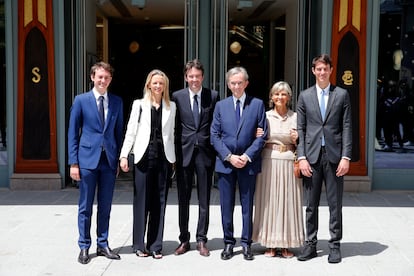
Two of Arnault’s five children, Alexandre (31) and Frédéric (29), were appointed to the board of directors, granting them the ability to influence strategic decisions. They join Delphine and Antoine Arnault — the children from their father’s previous marriage — who became board members in 2003 and 2005, respectively, while still in their twenties. Alexandre and Frédéric are now following a similar trajectory, having gained experience in the management of various subsidiaries. Alexandre has been promoted to the role of No. 2 at Tiffany & Co., while Frédéric has advanced through the ranks of the group’s watch division, which includes brands like TAG Heuer and Bulgari.
The luxury magnate and his closest family members control the majority of votes on the board. This summer, their ownership stake was reorganized, ensuring that the five children are equally represented in Financière Agache, which controls 48% of LVMH’s capital. To prevent disputes, for the next 30 years, they cannot sell the shares — an arrangement that forces the five heirs to come to an agreement. However, the position of future CEO remains undecided, with no names officially leaked for this critical role. For now, Arnault remains at the hel, and has five-year window to make the big decision.
Mexico
Slim delegates, but does not give up control
By Karina Suarez (Mexico)
At 84, Carlos Slim Helú is not yet contemplating retirement. As the richest man in Mexico and Latin America, with a net worth of $89.4 billion, he remains a significant shareholder in numerous companies, including Prisa, the publisher of EL PAÍS. Slim, along with his family, owns América Móvil, the largest cell phone operator in Latin America. While this company is the crown jewel of his empire, generating over $46 billion in annual revenue, Slim’s business interests extend across a vast array of sectors, including construction, oil, mining, insurance, banking, and commerce. Although the multimillionaire stays actively engaged in his ventures and has not publicly addressed his succession plan, he has been gradually delegating responsibilities to his children, sons-in-law, and grandchildren over the past two decades.
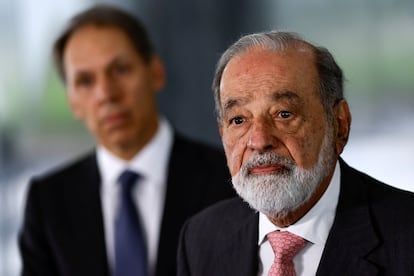
The Mexican businessman’s six children already occupy key positions within his companies and foundations, with some of his grandchildren even serving on corporate boards. Carlos Slim Domit, his eldest son at 57, chairs the boards of América Móvil, Telmex, Grupo Carso, and Sanborns. His second son, Marco Antonio Slim, leads Grupo Financiero Inbursa, one of Mexico’s major financial institutions. The third in line, Patrick Slim, has assumed general management of the Sanborns stores. Meanwhile, his daughters — Soumaya, Vanessa, and Johanna — oversee his museums and philanthropic organizations.
Other key figures in Carlos Slim’s businesses include his sons-in-law, Arturo Elías Ayub and Daniel Hajj. Elías Ayub serves as the Director of Strategic Alliances at Telmex, while Hajj is the General Director of América Móvil, one of the group’s most profitable companies. Although management of his primary enterprises is now largely in the hands of his children, Slim has established a majority family trust — a legal structure designed to protect his businesses from outside interests.
Germany
The large (and controversial) family behind an automotive icon
By Almudena de Cabo (Berlin)
Porsche and Volkswagen have been intertwined for decades, shaped by the complex and sometimes fraught history of their founding families, the Porsches and the Piëchs. This clan, which prefers to maintain a low public profile, wields significant influence in the German automotive industry, with their combined assets now totaling €30 billion ($32 billion).
As the family approaches its fourth generation, there are now about three dozen great-grandchildren of Ferdinand Porsche, who founded the automotive group in 1931 and created the iconic Beetle — the model on which Volkswagen (VW) built its post-World War II success. Two grandsons, both in their 80s, remain at the helm: Wolfgang Porsche and his cousin Hans Michel Piëch, representing the two family lines.
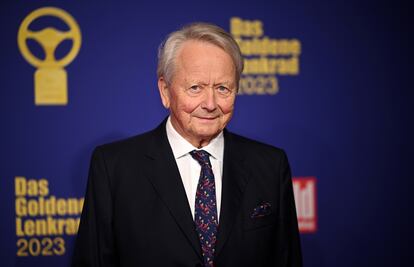
Porsche joined the VW Group in 2005, and two years later, the company was divided into two entities: the sports car division, renamed Porsche AG, and the holding company, fully controlled by the Porsche and Piëch families, now known as Porsche Automobil Holding SE (Porsche SE). Today, Porsche SE is the largest shareholder of the VW Group, owning 53.3% of its voting shares. This group encompasses various renowned brands, including Volkswagen, Audi, Škoda, SEAT, Lamborghini, and Porsche.
On September 29, 2022, Porsche AG went public, allowing the family to reclaim direct control over the sports car brand. Their family company, Porsche SE, acquired 25.1% of the voting shares in Porsche AG that had previously been held by the VW Group. This acquisition grants the Porsche family a qualified minority, enabling them to block significant decisions.
Wolfgang Porsche, 82, currently leads the family, representing the direct descendants of founder Ferdinand Porsche across five generations. While the company’s IPO has set the stage for succession, little is known about who will assume the role of paterfamilias when he is no longer around. Recently, Wolfgang went through a high-profile divorce from his wife, who had been suffering from dementia, to begin a relationship with Aga Khan’s ex-wife.
Italy
Armani: the challenge of replacing a legend
By Lorena Pacho (Rome)

Giorgio Armani’s situation stands out in today’s fashion industry and global finance. His empire is intricately linked to his personal vision; the founder meticulously oversees every detail, from the clothing collections showcased each year to the financial decisions that steer the company. As the designer, CEO, and sole shareholder of the brand that bears his name, Armani has consistently prioritized independence in a sector increasingly dominated by large luxury conglomerates.
Now, at 90 years old, the question of succession is becoming critical. Armani has no children or clear heirs to take over his esteemed fashion house, although some relatives are part of the company’s board. This uncertainty about the future of such an iconic brand has become a pressing concern in Italy. Identifying a suitable successor for a fashion legend is no small task. In response to this challenge, Armani is proactively working to tie up loose ends; he has recently shared that he has created a comprehensive succession plan to ensure the continuity of his legacy once he steps down from the helm of the fashion group.
The designer has acknowledged that he is not looking for a single successor for his empire; instead, he is leaning towards a collective of trusted collaborators to fill the leadership void when he departs. Over the years, he has carefully selected and trained a talented group to ensure the company continues to thrive while upholding the brand’s core values. Among this group are his nieces Silvana and Roberta Armani, as well as his nephew Andrea Camerana and Leo Dell’Orco, the fashion maestro’s right-hand man for over 40 years.
Additionally, the veteran designer has made it clear that he is open to various possibilities for the future, including the potential for an initial public offering (IPO) — a prospect that analysts are watching with keen interest and optimism.
China
Women take power
By Inma Bonet (Beijing)
Four decades after China initiated its economic reform and began opening up to private investment, many of the country’s prominent private entrepreneurs are facing the pivotal moment of relinquishing control over the corporate empires they established from the ground up. Some have successfully passed the baton to a second generation, which is now striving to uphold their parents’ legacies in an increasingly competitive landscape marked by complex market dynamics and evolving economic policies.
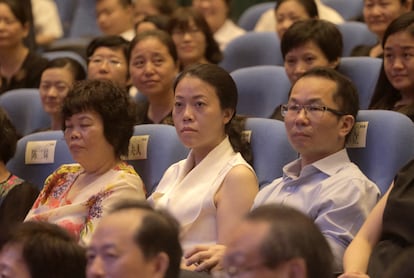
This is the case of Country Garden, once the largest real estate developer in China and among the largest in the world. Its founder, Yang Guoqiang, began handing over power to his eldest daughter, Yang Huiyan, in 2005, when she was just 23 years old and had recently graduated in Marketing and Logistics from Ohio State University. A year later, as part of the reorganization in preparation for the IPO in Hong Kong, he transferred 70% of the company’s shares to her, which ensured her control of the business.
In 2012, she was appointed vice president, and since 2018, she has served as co-chair alongside her father. In 2023, she officially took over the presidency after her father retired. However, this transition has coincided with an extremely precarious moment for the entire Chinese real estate industry. The company is on the brink of bankruptcy, and most of the assets Yang inherited have diminished significantly due to a collapse in share prices.
Other major Chinese firms have followed a similar path. A similar example is Zong Fuli, daughter of the recently deceased Zong Qinghou, founder of the Wahaha Group, one of China’s leading beverage producers. Fuli, also an American university graduate, held the position of vice chair and general manager since 2021 and officially took over this year. Under her leadership, the company has begun diversifying into new sectors, such as real estate and technology.
Meanwhile, Ren Zhengfei, founder of the technology giant Huawei, has entrusted his daughter, Meng Wanzhou, with key strategic roles, including financial management.
Spain
All eyes are on Mercadona and Inditex
In the Spanish business sector, two notable succession processes are currently in the spotlight: Mercadona and Inditex. In the case of the supermarket chain Mercadona, secrecy prevails, while the fashion giant Inditex has made some steps in management transitions, although questions remain regarding share distribution.
The succession of Juan Roig, the president and largest shareholder of the supermarket chain Mercadona, is a recurring topic whenever he faces journalists. “I will continue as long as I am in perfect physical and mental condition,” he said at the presentation of the 2023 results in March. Roig, who turned 75 on October 8, was accompanied by his wife, Hortensia Herrero, who holds 27.71% of the company, and their daughter Carolina, who made her first appearance as secretary of the board and a market analyst.
Roig has three other daughters: Juana, Amparo, and Hortensia. Juana, along with Carolina, works at Mercadona, where she heads the digital department.
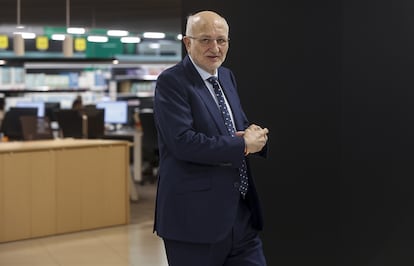
Regarding Roig’s succession, Mercadona points to the CEO’s own statements: he enjoys being a businessman and admits he wouldn’t know what to do if he were to retire. The company confirms it has established protocols and systems that would enable the appointment of a replacement on the same day if Roig were to face an incident, ensuring that the new leader would have the same decision-making authority. “I know who is going to replace me, but he or she does not know,” Roig said three years ago.
One potential candidate is Juana Roig. When asked about the succession issue in February last year, she said that “it makes more sense for the successor to be an executive than a family member,” echoing her father’s sentiment that “shares are inherited, but not the position.” This seemed to imply that she might not be the frontrunner for the role. “Running Mercadona is a very big challenge,” she added during an interview on the podcast of the Itnig co-working company.
At the management level, Juan Roig has also surrounded himself with a trusted circle. A year ago, he restructured his executive committee, eliminating six general directors and reinforcing the influence of three longstanding directors: Paco Espert, Rafael Berrocal, and José Jordá. These three have remained in the governing body for the past 15 years without interruption. As of now, according to Roig, they do not know if they will be his chosen successors.
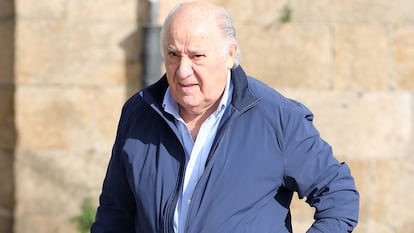
Discussing the succession at Inditex means discussing the future of Spain’s largest fortune. Amancio Ortega, the founder and principal shareholder of the retail giant — which inlcudes brands like Zara, Oysho and Bershka — oversees an empire with a stock market valuation of €165 billion ($177 billion). His 59.3% stake is valued at nearly €100 billion ($107 billion).
This year alone, Ortega will receive €2.85 billion ($3.07 billion) in dividends from Inditex, highlighting its immense financial legacy. Beyond Inditex, Ortega has built a vast real estate empire, largely funded by the profits from the retail company. Through Pontegadea Inversiones, which holds 50% of his stake in Inditex, he controls a portfolio of properties valued at over €18 billion ($19.4 billion). An additional 9.3% of Inditex shares are held through the company Partler.
At the corporate level, succession planning at Inditex has already made significant progress. In 2011, Ortega, now 88, stepped down as chair, distancing himself from the company’s formal management. Until 2022, that role was held by Pablo Isla. On April 1 of that year, Marta Ortega, his youngest daughter, was appointed chair, which Inditex hailed as the culmination of the “generational transition process” that began with Amancio Ortega’s departure.
However, the key question revolves around the distribution of Ortega’s shareholding. Ortega has three children: Sandra, Marcos, and Marta. Sandra and Marcos are from his first marriage to Rosalía Mera. Sandra Ortega is Inditex’s second-largest individual shareholder, holding 5% of the company’s capital — shares inherited from her mother, who passed away in 2013. Sandra also manages the assets of her brother, Marcos, who was born with cerebral palsy.
Those close to Pontegadea have repeatedly emphasized that any future decisions will prioritize Inditex’s long-term stability. The company itself has declined to comment on the protocols or processes that would guide the succession.
Sign up for our weekly newsletter to get more English-language news coverage from EL PAÍS USA Edition
Tu suscripción se está usando en otro dispositivo
¿Quieres añadir otro usuario a tu suscripción?
Si continúas leyendo en este dispositivo, no se podrá leer en el otro.
FlechaTu suscripción se está usando en otro dispositivo y solo puedes acceder a EL PAÍS desde un dispositivo a la vez.
Si quieres compartir tu cuenta, cambia tu suscripción a la modalidad Premium, así podrás añadir otro usuario. Cada uno accederá con su propia cuenta de email, lo que os permitirá personalizar vuestra experiencia en EL PAÍS.
¿Tienes una suscripción de empresa? Accede aquí para contratar más cuentas.
En el caso de no saber quién está usando tu cuenta, te recomendamos cambiar tu contraseña aquí.
Si decides continuar compartiendo tu cuenta, este mensaje se mostrará en tu dispositivo y en el de la otra persona que está usando tu cuenta de forma indefinida, afectando a tu experiencia de lectura. Puedes consultar aquí los términos y condiciones de la suscripción digital.








































